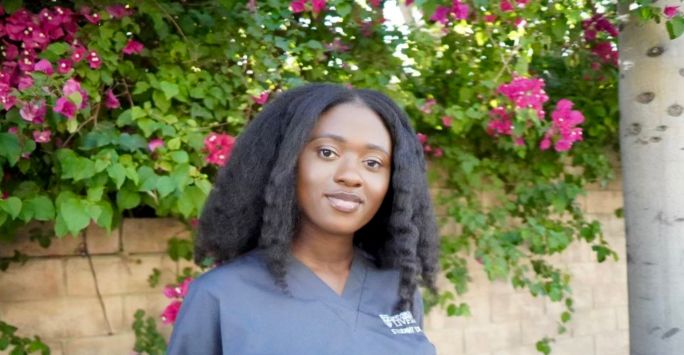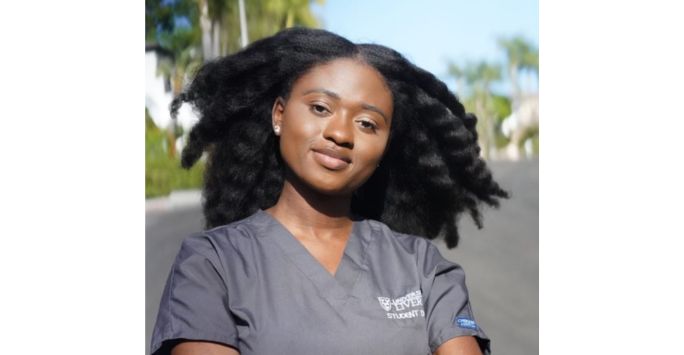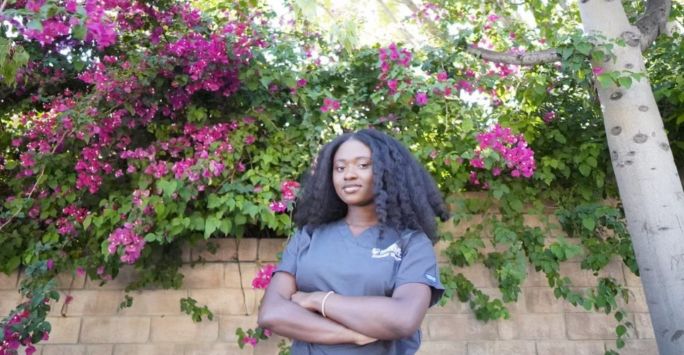
The first year of medical school can feel like a big change for new students. It goes without saying that studying topics like physiology and anatomy should be a top priority, but they shouldn’t be the only priority. Finding a healthy balance between school life and personal life is extremely important.
Student Doctor Ghislaine D. M’bolo has just completed her first year at medical school at the University of Liverpool. Here’s a personal review of how she found Year 1; the initial feelings, the challenges, how she motivated herself and the importance of self-care. Ghislaine touches upon some highlights from her first year and provides practical advice which she hopes will help future Year 1 students this September.

Do you remember how you felt on your first day at the School of Medicine?
Yes, I do! Ever since graduating with a degree in International Relations, I have wanted to study medicine. Finally being in the welcome lecture and listening to the Dean, Professor Hazel Scott, and members of the Year 1 team was overwhelming. I had finally made it, and I felt an incredible sense of pride, motivation, and excitement. I also felt anxious about what lay ahead, I understood that studying medicine was challenging but chose to focus on the positives and that I was doing what I’d set out to accomplish. Overall, I was filled with anticipation for the journey ahead.
What have been some highlights from your first year at medical school?
Year 1 was a very exciting year for me. I made sure to get involved with as many activities and extra-curricular opportunities as my time would permit. However, a few moments stand out to me and will forever be a part of my Year 1 memories.
A significant highlight was attending the Human Anatomy Resource Centre’s (HARC) body donor memorial service. It was truly an honour to meet the family members of our silent teachers and learn about the lives that they lived and what led them to the selfless act of body donation. The experience highlighted the human aspect of medical education which should not be forgotten and what a privilege it truly is to benefit from the sacrifice our body donors make.
Another highlight was the opportunity to spend a day in theatre with Dr Mercer, an exceptional anaesthetist. Observing his expertise and seeing his commitment to his patients further solidified my interest in pursuing a career in anaesthesia. I will forever be grateful for the opportunity he gave me to learn, and I look forward to more clinical exposure in the future.
Finally, collaborating with other medical students in a global, student-led think tank on a research project has been incredibly rewarding. Having begun the research even before starting medical school, allowed me to appreciate the patience, dedication and organisational skills required to do research. The paper, which I hope will get published, taught me many invaluable lessons.
What have been some challenges you have faced and overcome during your first year?
Managing my own workload was the most challenging aspect of Year 1. To get through the challenging days, I always tried to remember my “why” – the reasons I chose to become a doctor. Focusing on the bigger picture helped me stay motivated.
Another challenge was adapting to different blocks. I found certain organ systems more challenging to learn about than others. By the end of the year, however, everything made more sense. Liverpool’s spiral curriculum enabled me to revisit challenging concepts multiple times throughout the year, reinforcing my understanding of important topics. Looking back, I can now appreciate that all the challenges I faced allowed me to improve my time management skills and prioritize self-care.
Do you have any tips for fellow or future students on how to balance work and social life?
In order to strike a healthy balance, I learned to make time for myself, that socialising boosted my mental health, and that I had useful self-care habits in place by the end of the year. My advice would be to plan and prioritise your week. Set clear goals for both academic and personal activities and try your best to stick to them – avoid procrastinating! Ensure that you don’t leave important tasks to the last minute and use every bit of your time wisely. For example, for tasks like case-based learning (CBL) that may take longer to complete, I recommend answering a few questions per day so that you complete the task and understand the content before the teacher-led sessions. Additionally, utilise gaps in your timetable as an opportunity for quiet study or group learning time with friends. Lastly, choose one day out of the week to either rest and recharge or go out and enjoy the city!
Did you join any societies and if so, what were the benefits of doing so?
I have an interest in anaesthetics, so I decided to join the Liverpool Anaesthetics and Critical Care Society (LACCS) very early on. Although I did not attend any of the society’s events in Year 1, I made sure to take every opportunity to learn more about the field of anaesthetics through online events and research participation.
I definitely encourage incoming Year 1 students to join societies; they are a great way to make new friends, network with professionals and stay up to date on developments in your field of interest. You may also choose to join non-academic societies, which is also great. If you have any hobbies, play any instruments or sports, joining a society will ensure you continue to do the things that make you happy. Your participation in societies can make your experience at the university even more enriching and memorable.

As we come to the end of your first year, what have been your favourite topics you have learned about so far?
I found myself excited to learn about most topics throughout the year. However, a few topics did stand out to me as time went on.
I really enjoyed going to the HARC to learn anatomy. The privilege of learning from body donors is something that I deeply appreciate and so make sure to use my anatomy time wisely. I also really enjoyed the gastrointestinal, cardiology and neurology blocks. Although I found them more difficult than other blocks, I took the challenge as an opportunity to spend more time on them and deepen my understanding of the physiology and biochemistry. In the end, I gained a deeper understanding of those blocks and enjoyed them thoroughly. Additionally, learning public, preventative, and global health (PPGH) for the first time was insightful because it provided me with a different perspective on health. I can now appreciate the interconnectedness of the social, economic, and environmental determinants of health and how they shape health outcomes.
What advice would you give to the next Year 1 cohort joining Liverpool this September?
Welcome to the beginning of a fulfilling journey! I have so much advice to give incoming medical students, but I will keep it brief. First, embrace every single opportunity to learn, and strive to acquire as much information as possible in your first year. Medicine is an ever-evolving and vast field, so make sure you are proactive from Year 1- this will provide you with a solid foundation as you evolve through your medical studies.
Second, enjoy the process. Although 5 (6 if you intercalate) years seems like a very long time to be in education, the time goes by very quickly! Try to focus on the final goal. Appreciate and enjoy the opportunity to study in such a world class institution!
Third, do not be afraid to ask for help, whether that be academic or emotional support, the medical school is like a big family with an expansive network to help you with everything you need. As a Peer Mentor, I am more than happy to have a chat with anyone who needs help. If, however, you find that you need more professional help, the school’s Wellbeing Team (link) is always available to support you.
Lastly, pace yourself. Medical school can be overwhelming, it is essential to strike a balance in the beginning to avoid burn out. Take time for yourself and build good routines and practices early on.
Stay curious, stay professional and enjoy your journey!
Finally, with the beginning of Year 2 now in sight, what are you most looking forward to and why?
There is so much to look forward to in Year 2, but I am mostly looking forward to revisiting the different system blocks with greater detail. Having a good understanding of the pathophysiology is something I know I will enjoy. Additionally, having a few weeks of clinical placements and getting to practise some of the clinical skills I learnt in my first year is something that excites me. Finally, I am looking forward to the prospect of being one step closer to becoming a doctor. Every year marks a significant milestone in achieving my goal, so I am eager to see what awaits me in Year 2!
Discover more
- If you are joining the School of Medicine this autumn, you can find information about what to do next as a new student here (link) or check out our latest articles for study tips and news (link).
- Find a society (link) to join via the Guild’s website.
- Get in touch with mednews@liverpool.ac.uk if you are studying at the School of Medicine and are interested in also sharing how your previous academic year as a medical student went.